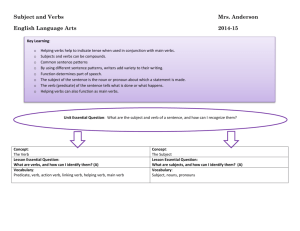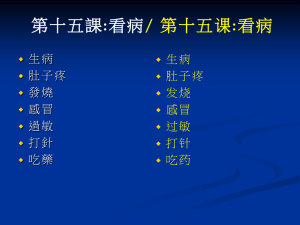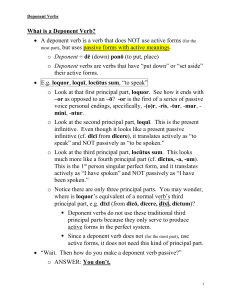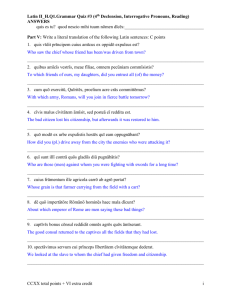File
advertisement
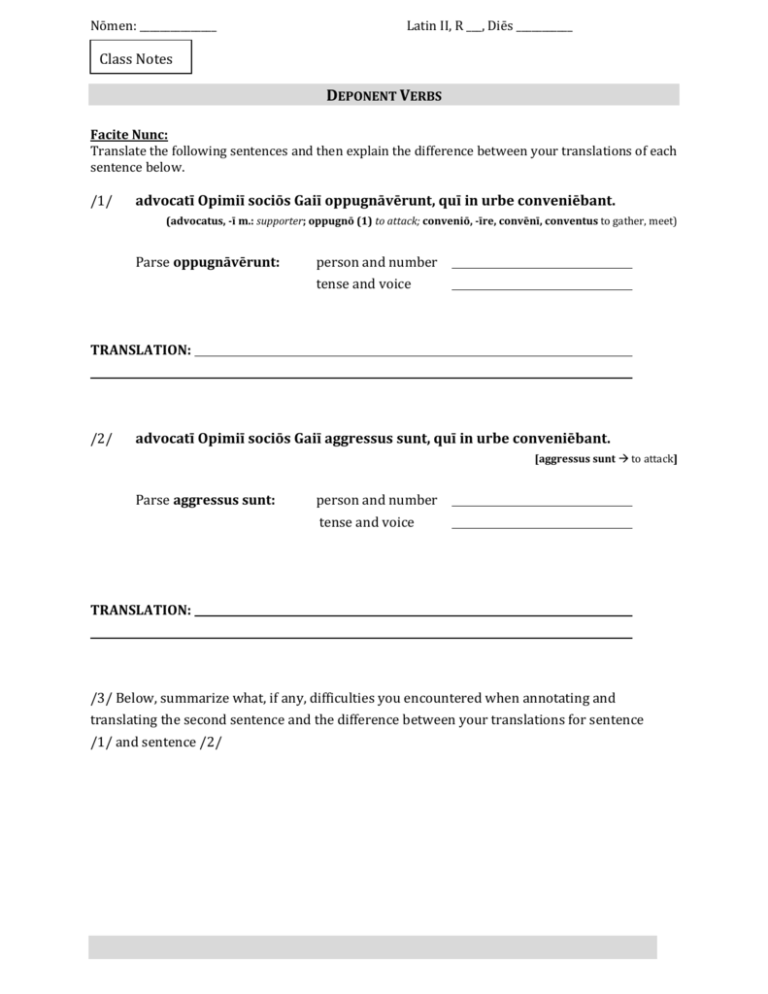
Nōmen: _______________ Latin II, R ___, Diēs ___________ Class Notes DEPONENT VERBS Facite Nunc: Translate the following sentences and then explain the difference between your translations of each sentence below. /1/ advocatī Opimiī sociōs Gaiī oppugnāvērunt, quī in urbe conveniēbant. (advocatus, -ī m.: supporter; oppugnō (1) to attack; conveniō, -īre, convēnī, conventus to gather, meet) Parse oppugnāvērunt: person and number tense and voice TRANSLATION: /2/ advocatī Opimiī sociōs Gaiī aggressus sunt, quī in urbe conveniēbant. [aggressus sunt to attack] Parse aggressus sunt: person and number tense and voice TRANSLATION: /3/ Below, summarize what, if any, difficulties you encountered when annotating and translating the second sentence and the difference between your translations for sentence /1/ and sentence /2/ Nōmen: _______________ Latin II, R ___, Diēs ___________ Class Notes DEPONENT VERB FORMS The difficulty with sentence 2 probably came from the verb aggressus sunt. If you were to look this word up in the dictionary, you would find: aggredior, aggredī, aggressus sum: to attack, approach What is unusual about this dictionary entry? > the verb has principal parts, instead of > the principal parts all look > although the verbs look must be , the translation of the verb . A Latin verb that possesses these three qualities is called a verb. EXERCEĀMUS! Annotate and translate the sentences below. The underlined verbs are deponent. Use your Term 3 Midterm Vocabulary list for help. 1. Gaius uxorī aliquid praeter amōrem nōn pollicērī poterat antequam domō cessit. (praeter +ACC: except, besides) Parse pollicērī: tense and voice Translation: 2. Licinia, timēns virum interficī poterit, illum in viā perīculosiore perditissimē impedīre conābātur. Parse conābātur: tense, voice, person, number Translation: 3. passa Gaiī digressum, Licinia luctū metūque in terrā cecidit et multum flevit. (digressus, -ūs m.: departure; fleō, flere, flevī, fletus: to weep, cry; cadō, cadere, cecidī, casus: to fall) Parse passa: Translation: tense, voice, person, number Nōmen: _______________ Latin II, R ___, Diēs ___________ Class Notes Deponent Verb Forms Deponent verbs look the following way in the dictionary: aggredior, aggredī, aggressus sum: to attack, approach What is unusual about this dictionary entry? > the verb has 3 principal parts, instead of 4 > the principal parts all look passive > although the verbs look passive, the translation of the verb must be active. > there are NO PASSIVE TRANSLATIONS for a deponent verb because deponent verbs do not have 4th principal parts to form passive verb forms DEPONENT VERB List LATIN WORD ENGLISH DEFINITION CONJUGATION NUMBER aggredior, aggrēdī, aggressus sum to approach 3rd –io conor, conārī, conātus sum to try, attempt 1st to go out, leave 3rd –io to walk, step 3rd –io to encourage, urge 1st to speak, talk 3rd to wait for 4th to suffer, permit, allow 3rd -io to promise 2nd to set out, depart 3rd to follow 3rd ēgredior, ēgredī, ēgressus sum gradior, gradī, gressus sum hortor, hortārī, hortātus sum loquor, loquī, locūtus sum opperior, opperīrī, oppertus sum patior, patī, passus sum polliceor, pollicērī, pollicitus sum proficīscor, proficīscī, profectus sum sequor, sequī, secutus sum Nōmen: _______________ Latin II, R ___, Diēs ___________ Class Notes GAIUS’ FLIGHT As a great fight broke out between Opimius’ and Gaius’ supporters, Gaius sought safety from the mob in the nearby temple of Diana. Then, the doors to the temple opened quite slowly.... 1. II amīcī, fīdissimī Gaiō, Pomponius Liciniusque, in ostiō stetērunt. Gaiō suadissimē 2. loquēbantur et pollicitī sunt hoc: “ē templō proficīscī poteris et ab omnī perīculō 3. vītam eius servābimus.” Gaius, ab amīcīs impulsus, illōs ad ostium secutus est, sed 4. primum Dianam precātus est: “tē precor, potēntissima dea: omnēs Rōmānī, quī 5. celerrimē societātem suam contrā mē vertērunt, nunc senātōrēs sequuntur et semper illīs 6. ferōciōribus dominīs servīre debēbunt”. statim ē templō ēgressī sunt. 7. mox Gaius, (ē) Romā gressus, advocatōs Opimiī, quī eum sequēbāntur, vīdit. Pomponius 8. Liciniusque, eum servāre pollicitī, in ponte hostēs repulsērunt dum Gaius cum suō 9. servō domum profectus est. VOCABULARY accendō, -ere, accendī, accensum to summon advocatus, -ī m. supporter contrā (+ACC) against debeō, debēre, debuī, debitus should, ought, must; to owe Diana, -ae, f. Diana, goddess of the hunt and moon domus, -ūs f. house; home dum while; until fīdus, -a, -um loyal hostis, hostis m. enemy ille, illa, illud that impellō, -ere, impulī, impulsus to push, to persuade lūcus, lūcī, m. grove (wooded area with trees) omnis, omnis, omne all, every Opimius, -ī m. Opimius ostium, -ī, n. doorway pariter together perīculum, -ī n. danger pōns, pontis, m. bridge precor, precārī, precātus sum to pray to, to beseech, to beg repellō, -ere, reppulī, repulsum to repulse, to hold back, to ward off serviō, -īre, servīvī, servītus to be a slave to (+DAT) servō, -āre, servāvī, servātus to protect, to save servus, -ī m. slave societas, societātis f. allegiance, alliance statim immediately stō, stare, stetī, status to stand suadus, -a, -um persuasive templum, -ī n. temple vertō, -ere, vertī, versus to change, to exchange vīta, -ae f. life Nōmen___________________ Class Notes TRANSLATION: 1. 2. 3. 4. 5. 6. 7. 8. 9. Latin II, R ____ Diēs est _______________


